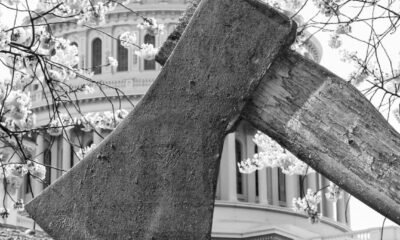2024 election
Court vs. Voters: The Battle Over Prop 140’s Future

Arizona Secretary of State Adrian Fontes urged the state Supreme Court on Friday to allow voters to determine the outcome of the Make Elections Fair Act, rather than leaving it up to the judicial system.
As ballots are prepared in many Arizona counties, Proposition 140 is set to appear on them. However, the validity of the votes could be questioned after the Supreme Court previously directed a trial court to reevaluate the challenges related to the petition signatures required for the measure.
A previous ruling from the trial court indicated that the proposed evidence, which suggested that approximately 40,000 signatures were duplicates, would not be considered. The court determined that Prop. 140 had more than 32,000 valid signatures than necessary.
“The Arizona Constitution does not allow for a measure to be on the ballot with millions of votes cast, only for those votes to later be deemed invalid,” stated Kara Karlson, an assistant attorney general, in a court filing on behalf of Fontes.
The Supreme Court’s recent instruction for the trial court to reopen the case introduces an unsettling possibility. If the renewed evaluation of signatures disqualifies the measure, the chief justice indicated that votes on the measure may not be counted.
Should voters approve it, the Make Elections Fair Act aims to revise the Arizona Constitution to implement an open primary system. This would allow all candidates for various offices to compete in a single primary election, which would include unaffiliated candidates and grant all voters the opportunity to vote for their preferred candidates without the restriction of party-specific ballots.
The initiative seeks to stir up competition, particularly in races traditionally dominated by one party, likely leading to shifts in expected election outcomes.
The committee advocating for the Make Elections Fair Act has called for the Supreme Court to reconsider its deadline actions, arguing that the printing of ballots precedes the resolution of the case. Ignoring votes cast on this measure would disenfranchise voters, they claim.
Conversely, those challenging the signatures contend that the evidence of duplicates must be acknowledged. Daniel Arellano, representing the challengers, noted clear instances of obvious duplication, including 15 signatures from a single individual.
The Supreme Court asserted it was not bound by printing deadlines, emphasizing that courts must not hastily render decisions simply to meet such timelines. Chief Justice Ann Scott Timmer reinforced this point in an August 23 order, stating that delivering justice cannot be rushed.
Fontes argued, in alignment with the committee’s stance, that allowing the challenge to proceed past the printing deadline contradicts established judicial precedents. “Once ballots are printed, it’s up to the people of Arizona,” Karlson argued, highlighting the need for finality in electoral decisions.
Karlson pointed out worries over entrusting courts with the decision to disregard already cast votes, especially given recent trends of election skepticism in Arizona. She voiced concern that such a ruling could exacerbate existing tensions surrounding election integrity.
The imminent deadline for ballots to be sent to military voters is approaching, with early voting set to commence on October 9. This timeline adds urgency to the ongoing legal disputes.
“Arizona’s public policy strongly supports certainty and finality in elections,” Karlson stated, noting that election officials have diligently verified petition signatures within strict statutory timelines, while challengers have not faced similar constraints.
In conclusion, Karlson emphasized that any potential court order preventing votes from being included in the final results poses significant risks and called upon the court to reaffirm the principle that challenges should cease once ballots are printed.


















